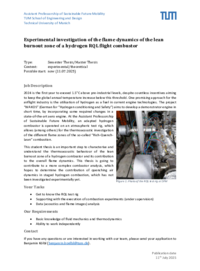Experimental investigation of the flame dynamics of the lean burnout zone of a hydrogen RQL flight combustor
- Institut
- Professur für Sustainable Future Mobility
- Typ
- Semesterarbeit Masterarbeit
- Inhalt
- experimentell theoretisch
- Beschreibung
Job Description
2024 is the first year to exceed 1.5°C above pre-industrial levels, despite countless incentives aiming to keep the global annual temperature increase below this threshold. One promising approach for the airflight industry is the utilisation of hydrogen as a fuel in current engine technologies. The project “WAKOS” (German for “Hydrogen conditioning and Safety”) aims to develop a demonstrator engine in short time, by incorporating some required changes in a state-of-the-art aero engine. At the Assistant Professorship of Sustainable Future Mobility, an adapted hydrogen combustor is operated on an atmospheric test rig, which allows (among others) for the thermoacoustic investigation of the different flame zones of the so-called “Rich-Quench Lean” combustion.
This student thesis is an important step to characterise and understand the thermoacoustic behaviour of the lean burnout zone of a hydrogen combustor and its contribution to the overall flame dynamics. This thesis is going to contribute to a more complex combustor analysis, which hopes to determine the contribution of quenching air dynamics in staged hydrogen combustion, which has not been investigated experimentally yet.
Your Tasks
- Get to know the RQL test rig
- Supporting with the execution of combustion experiments (under supervision)
- Data (acoustics and flame images) analysis
Our Requirements
- Basic knowledge of fluid mechanics and thermodynamics
- Ability to work independently
Contact
If you have any questions or are interested in working with our team, please send your application to Benjamin Kölbl (benjamin.koelbl@tum.de).
- Möglicher Beginn
- now
- Kontakt
-
Benjamin Kölbl
Raum: 1703b
Tel.: +49 (89) 289 16235
benjamin.koelbltum.de - Ausschreibung
-
